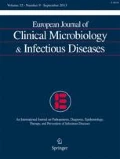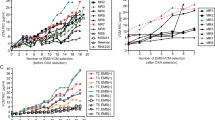Abstract
Numerous conflicting reports describing clinical penicillin tolerant Staphylococcus aureus isolates have raised questions concerning the reproducibility and genetic homogeneity of such isolates. The purpose of our study was to construct a tolerant mutant which would then serve as a reference strain and could also be used for testing the potential significance of antibiotic tolerance during chemotherapy of staphylococcal infections. A penicillin sensitive laboratory mutant strain was mutagenized and exposed to cycles of penicillin selection. A culture was then obtained which lost about 1 log of viability during exposure to up to 1000 times the MIC of penicillin. The same conditions caused a 3–4 log decline in the viability of the parent cell. The tolerance property was stable for at least 150 generations of nonselective growth and was reproducible in randomly picked colonies. The superior survival during treatment was also demonstrable in cultures grown in rabbit serum or cerebrospinal fluid. Penicillin tolerant cultures could also be obtained by selection without mutagenesis, suggesting that such a mutant may indeed be selected for in the clinical environment.
Similar content being viewed by others
References
Handwerger, S., Tomasz, A.: Antibiotic tolerance among clinical isolates of bacteria. Reviews of Infectious Diseases 1985, 7: 368–386.
Tomasz, A., Albino, A., Zanati, E.: Multiple antibiotic resistance in a bacterium with suppressed autolytic system. Nature 1970, 227: 138–140.
Layte, S., Harris, P., Rolinson, G. N.: Factors affecting the apparent regrowth ofPseudomonas aeruginosa following exposure to bactericidal concentrations of carbenicillin. Chemotherapy 1984, 30: 26–30.
Taylor, P. C., Schoenknecht, F. D., Sherris, J. C., Linner, E. C.: Determination of minimum bactericidal concentrations of oxacillin forStaphylococcus aureus: influence and significance of technical factors. Antimicrobial Agents and Chemotherapy 1983, 23: 142–150.
Tuomanen, E., Liu, H., Hengstler, B., Zak, O., Tomasz, A.: The induction of meningeal inflammation by components of the pneumococcal cell wall. Journal of Infectious Diseases 1985, 151: 859–868.
Goessens, W. H. F., Fontijne, P., van Raffe, M., Michel, M. F.: Tolerance percentage as a criterion for the detection of tolerantStaphylococcus aureus strains. Antimicrobial Agents and Chemotherapy 1984, 25: 575–578.
Meylan, P. R., Francioli, P., Glauser, M. P.: Discrepancies between minimal bactericidal concentration and killing of viridans group streptococci by cell wall active antibiotics. Antimicrobial Agents and Chemotherapy 1986, 29: 418–423.
Tuomanen, E. T.: Phenotypic tolerance: the search for beta-lactam antibiotics that kill nongrowing bacteria. Reviews of Infectious Diseases 1986, 8, Supplement 3: S279-S291.
Author information
Authors and Affiliations
Rights and permissions
About this article
Cite this article
Tomasz, A., de Vegvar, M.L. Construction of a penicillin-tolerant laboratory mutant ofStaphylococcus aureus . Eur. J, Clin. Microbiol. 5, 710–713 (1986). https://doi.org/10.1007/BF02013310
Issue Date:
DOI: https://doi.org/10.1007/BF02013310




